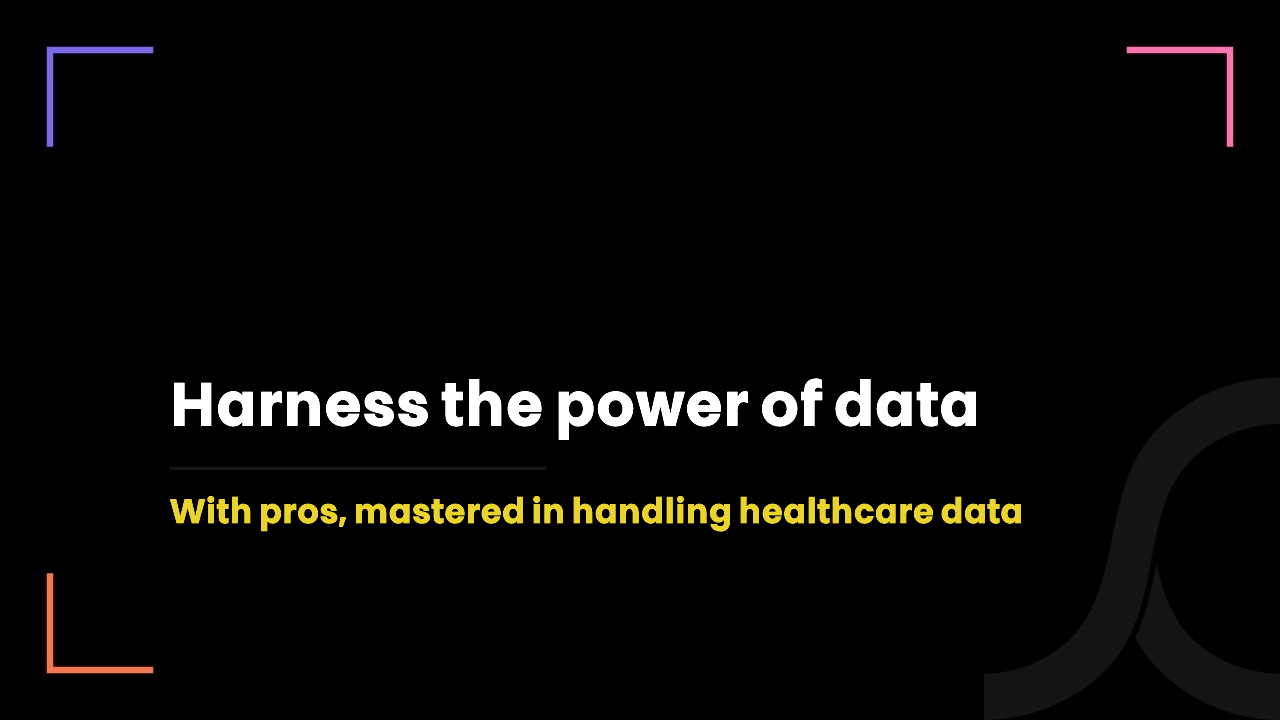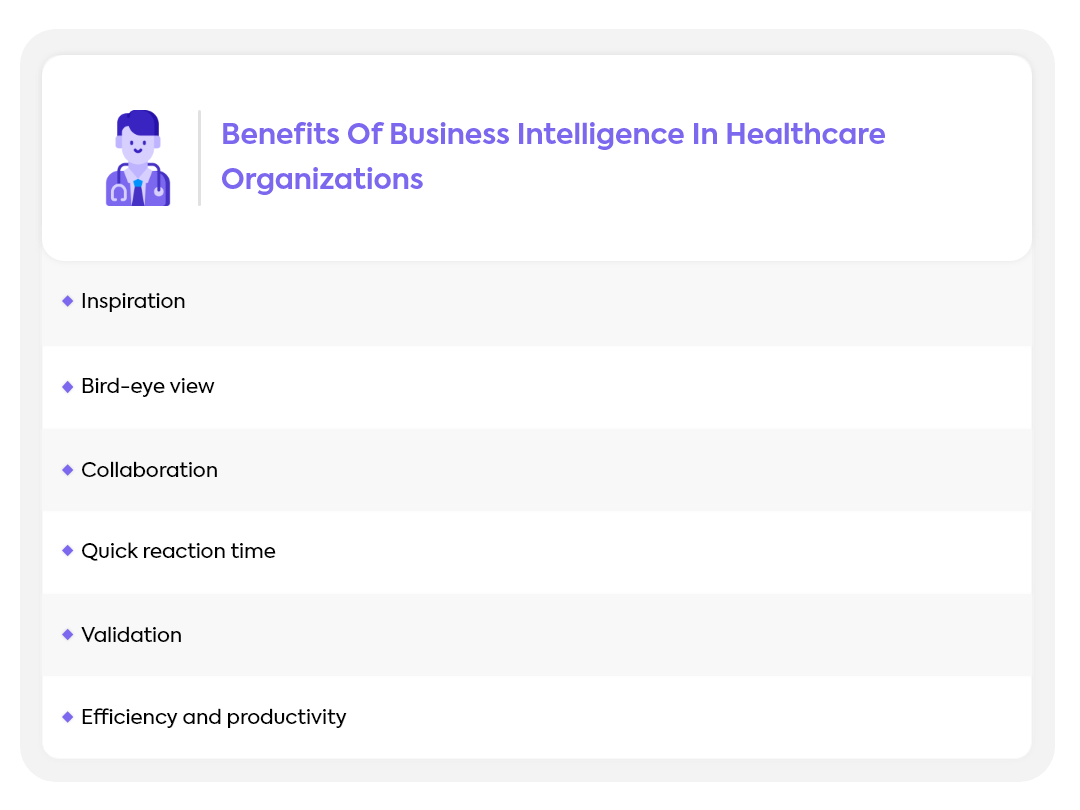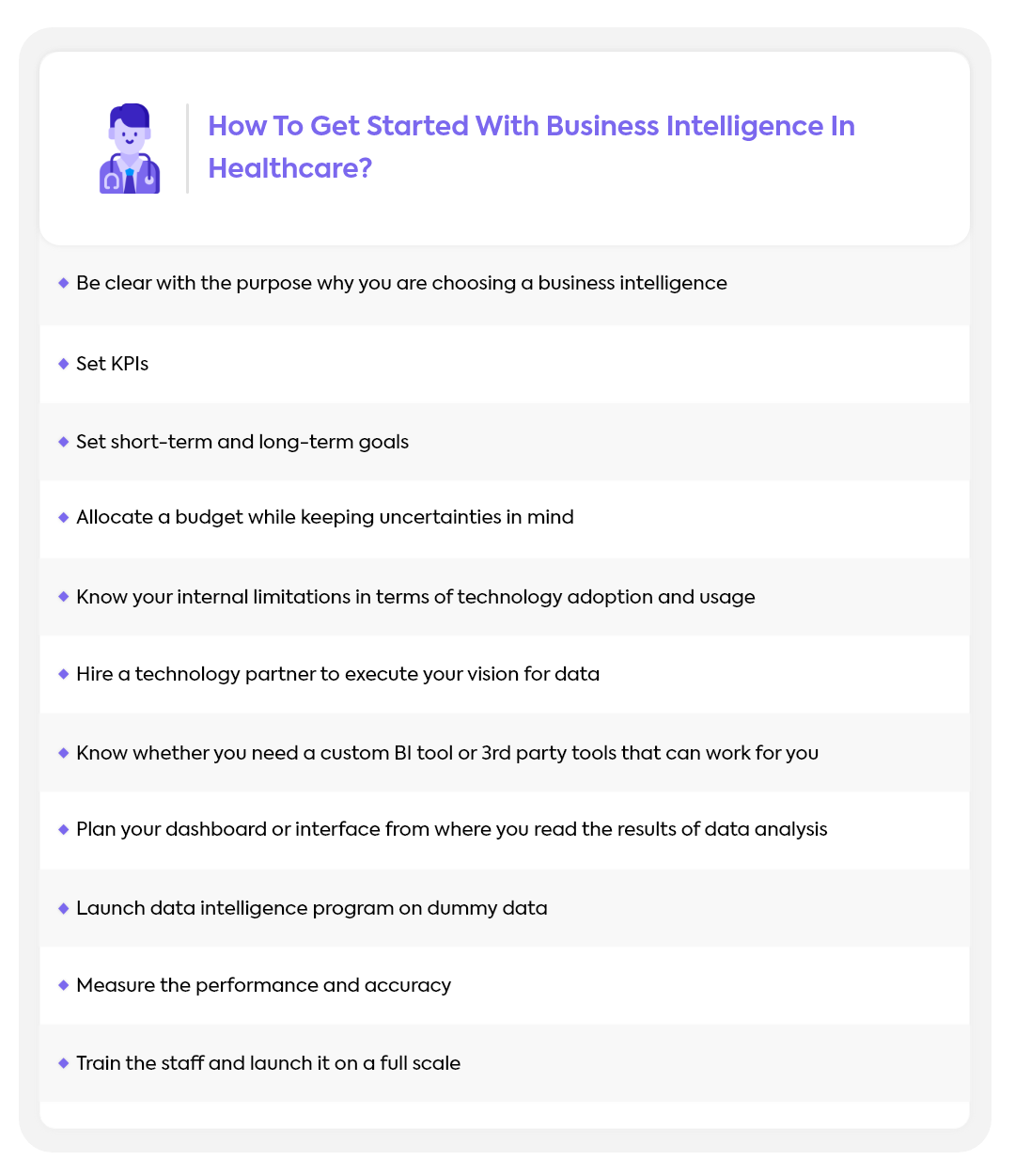How Would the Healthcare Industry Use Business Intelligence?: A Guide to Make Data Work for You

1 year ago
Businessmen run their businesses with gut feelings. In contrast, entrepreneurs (modern-world businessmen) run their businesses with the power of data.
Data can bring value to any organization if it is used with such a mindset.
Talking specifically about healthcare, clinical, and administrative data usage in a standardized way is overwhelming yet rewarding.
Different healthcare entities including startups, hospitals, payers, clinical research sites, pharmacies, and drug manufacturers can aid their executives in making decisions that they would never regret.
However, working with data, especially in healthcare settings is a challenge.
To overcome it, the perfect balance between human intelligence and business intelligence tools is essential.
So, in this blog, we will discuss how the healthcare industry uses business intelligence and how we can help you convert healthcare data into actionable insights with healthcare business intelligence solutions.
What Does Business Intelligence Mean for the Healthcare Industry?: Healthcare Business Intelligence Example
The best way to understand healthcare business intelligence is with an example.
Suppose, a hospital chain is falling short of clinical and administrative staff.
They manually cannot be able to estimate the number of new team members they would require to serve patients instantly as the patient footprint is pretty unusual and in a very inconsistent manner.
So, the only option they have is to put healthcare business intelligence to good use.
By feeding their past data of patient footprint and available staff into a BI tool, they can easily estimate the number of new clinical and administrative team members they would require.
The BI tools leverage the power of data, apply AI techniques, and represent insights into business practice in a graphical way for easy understanding.
With this insight boasting high accuracy, hospitals can make precise decisions around their recruitment requirements, leading to cost-saving, time-saving, and high business performance.
What Can Business Intelligence Do for Healthcare Entities?
The more general answer is that business intelligence helps healthcare entities look into data, get actionable insights, and make data-driven strategic decisions.
But if we talk about the specific answer, healthcare business intelligence helps healthcare entities in 3 major ways.
- Descriptive analytics
Descriptive analytics is the most simple form of data analysis.
It is a process of analyzing current and historical data to identify trends and patterns between multiple variables.
Descriptive analytics is useful in making data-driven decisions as it is majorly used to analyze engagement, financial statements, demand, supply, and progress to goals.
- Predictive analytics
Predictive analytics is part of advanced analytics techniques as it generally deals with the future.
Based on current and historical data, it predicts the future trends and future outcomes of any decision made in the present.
To predict the future in a literal sense, predictive analytics utilizes the perfect fusion of statistical modeling, data mining techniques, and machine learning.
Healthcare organizations can deploy predictive analytics to discover hidden risks and opportunities.
- Prescriptive analytics
The best part of prescriptive analytics is that it provides you with data-backed decision options.
In other words, it showcases the different options that you can implement and answers different questions such as what should be done, what should be done to make X happen, etc.
To give you such a deep understanding of data, it uses complex techniques such as graph analysis, simulation, complex event processing, neural networks, and recommendation engines.
What are the Benefits of Adopting Healthcare Business Intelligence?
Data alone does not deliver any value. It must be organized, filtered, and analyzed to drive the desired outcome in every clinical and administrative decision healthcare organizations make.
The following are the top benefits of business intelligence in the healthcare industry.

- Inspiration
Data inspires good impactful decisions.
With visualization through advanced interactive dashboards, even non-technical people in healthcare settings can visualize the data, understand it in more meaningful ways, and make decisions that work in their favor.
- Bird-eye view
A healthcare organization has access to the bird-eye view of its all departments, their KPIs, resource management, finance reports, patient inflows, etc as they have access to different data sources from a single dashboard.
- Collaboration
Different departments of healthcare organizations can discuss and execute improvements, either in a particular department or organization-wide, which are influenced by only real data.
- Quick reaction time
Data gives you a glimpse of what is likely to happen in the future.
If you mix your human intelligence here, you can be able to adopt change before your competitors can even think of it.
With such a quick reaction time to market changes, you can achieve a competitive edge.
- Validation
Many times, being an industry expert, you can easily predict the outcome of your decision.
But you lack any solid way to validate your decision.
Here is where you can use business intelligence practice to validate whether your industry experience talks the truth or not.
- Efficiency and productivity
Imagine having direct access to important KPIs that too in graphical format and business intelligence tools keep analyzing the real-time data to draw more conclusions!
You end up focusing on what matters and identifying the bottleneck in the early stage which fuels productivity.
Top Business Intelligence Tools You Can Employ in the Healthcare Industry
Here it is worth mentioning that Microsoft Power BI is the widely used BI tool.
However, all BI tools including Power BI have certain limitations.
So, when you have custom requirements and a long-term vision, it is preferable to build your business intelligence tool.
How Would the Healthcare Industry Use Business Intelligence?: Top Use Cases
Business intelligence can be applied and used in both the clinical and administrative operations of healthcare organizations.
The following are its top use cases.
- Measure financial performance
- Optimize patient onboarding workflow
- Predict the patient inflows
- Identify the scope for new healthcare technology
- Know the progress toward goals
- Know where resources are most active and engage
- Improve patient engagement
- Predict the medical inventory requirements
- Manage clinical and administrative staff
- Predict the care plans’ efficacy
- Support clinicians in decision-making
How To Get Started With Healthcare Business Intelligence?
You have made up your mind to leverage business intelligence in your healthcare setting to make data-driven strategic decisions.
However, the journey from your decision to execution is what takes its toll in the form of budget, goals, outcomes, peace of mind, scalability, and most importantly ROI.
So, to help you achieve the desired goals and claim high ROI, let us help you with a guide.

Case Study: Real-World Example of Using Data to Manage Hospital Productively and Efficiently
The project
Last year, we helped a London-based prominent multispecialty hospital to bring together all the data under a single platform and analyze it to derive actionable insights for better management.
How did we execute?
We designed and built a custom business intelligence platform dedicated to that hospital.
The platform works on cutting-edge AI/ML technologies to dig deep into data and present actionable insights.
